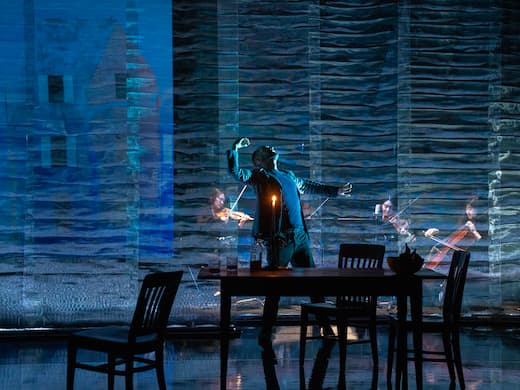Basic Questions Overshadow New Opera’s Brilliant Technical Elements
‘Note to a friend’ teeters in an uncomfortable no-man’s land between opera and contemporary theater.

While I’ll readily admit that there are pieces of theater that go right over my head — not because they’re vague or pretentious or purposefully obtuse, but because I just don’t understand them — there are some like composer David Lang’s “note to a friend” that prompt the question: “Do I not get this because I’m unsophisticated, or because it’s bad?”
Judging by a quick scan of the faces in the crowd at the Japan Society on Wednesday, this is a question I wasn’t the only one asking.
Mr. Lang’s new solo-singer opera is a literal postmortem, based upon “A Note to a Certain Old Friend,” a suicide letter left by a famed Japanese author, Ryūnosuke Akutagawa (1892-1927). The letter — like the show — is unsettlingly dispassionate in the face of death, reading in part, “Over the last two years or so I have thought only of death, and with special interest read a remarkable account of the process of death. While the author did this in abstract terms, I will be as concrete as I can, even to the point of sounding inhuman.”
Brilliant technical elements point us toward a production that might’ve been. Tom Schenk, a triple threat who tackled lighting and set and costume design, curates an aesthetic experience that skillfully occupies conflicting worlds — the English and the Japanese; the earthly and the beyond.
A string quartet comprising Japanese musicians chosen from the winners of Tokyo Bunka Kaikan’s competition sits behind a white taffeta scrim that cascades from the ceiling like water. With this initial picture, and the singer Theo Bleckmann — a close collaborator of Meredith Monk and Philip Glass — helming the production, I thought the stage might be set for something beautiful.
It was not to be. In spite of a heavy-hitting creative team and the technical wins, “note to a friend” teeters in an uncomfortable no-man’s land between opera and contemporary theater. Director Yoshi Oida’s attempts to harken back to the Japanese modern drama of the early 20th century fall flat, dragged down by sluggish pacing and awkward musical pauses. Mr. Bleckmann’s voice, while beautifully suited for jazz music, struggles to carry an hour-long opera. Good thing for his pipes that it’s a short run.
There is a desperate need, given the fierce debate over assisted dying, for a deftly written piece about suicide. However, Mr. Lang’s writing misses the mark, romanticizing and even glorifying the topic with lines like, “Having given myself to death, everything looks so much more beautiful to me now.”
Also, “note to a friend” leaves you with questions — not the profound kind, but those one must answer in Scene Study 101, such as, “Where is the piece set?” “Who are these men?” “How do they know each other?” “Why has ‘the dead man’ come back to tell his story, and why to this friend?” “Why should we care about this story?” Finally, “What’s the point?”
One question that doesn’t come up: “Do I not get this because I’m unsophisticated, or because it’s bad?”

